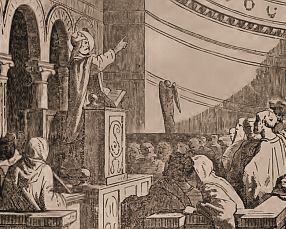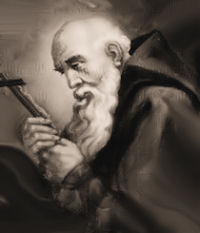Ordinary Time: February 19th
Thursday of the Sixth Week of Ordinary Time
Other Commemorations: Bl. Conrad of Piacenza Confalonieri, Hermit & Franciscan Tertiary (RM), St. Barbatus, Bishop (RM)
» Enjoy our Liturgical Seasons series of e-books!
Jesus, on seeing a crowd rapidly gathering, rebuked the unclean spirit and said to it, "Mute and deaf spirit, I command you: come out of him and never enter him again!" Shouting and throwing the boy into convulsions, it came out. He became like a corpse, which caused many to say, "He is dead!" But Jesus took him by the hand, raised him, and he stood up. When he entered the house, his disciples asked him in private, "Why could we not drive it out?" He said to them, "This kind can only come out through prayer (Mk 9:25-29)."
On Lent
Use Lent to vanquish the enemy, and be thus preparing for Eastertide. Accordingly, dearly-beloved, that we may be able to overcome all our enemies, let us seek Divine aid by the observance of the heavenly bidding, knowing that we cannot otherwise prevail against our adversaries, unless we prevail against our own selves. For we have many encounters with our own selves: the flesh desires one thing against the spirit, and the spirit another thing against the flesh. And in this disagreement, if the desires of the body be stronger, the mind will disgracefully lose its proper dignity, and it will be most disastrous for that to serve which ought to have ruled. But if the mind, being subject to its Ruler, and delighting in gifts from above, shall have trampled under foot the allurements of earthly pleasure, and shall not have allowed sin to reign in its mortal body, reason will maintain a well-ordered supremacy, and its strongholds no strategy of spiritual wickednesses will cast down: because man has then only true peace and true freedom when the flesh is ruled by the judgment of the mind, and the mind is directed by the will of God. And although this state of preparedness, dearly-beloved, should always be maintained that our ever-watchful foes may be overcome by unceasing diligence, yet now it must be the more anxiously sought for and the more zealously cultivated when the designs of our subtle foes themselves are conducted with keener craft than ever. For knowing that the most hollowed days of Lent are now at hand, in the keeping of which all past slothfulnesses are chastised, all negligences alerted for, they direct all the force of their spite on this one thing, that they who intend to celebrate the Lord's holy Passover may be found unclean in some matter, and that cause of offence may arise where propitiation ought to have been obtained.
Fights are necessary to prove our faith. As we approach then, dearly-beloved, the beginning of Lent, which is a time for the more careful serving of the Lord, because we are, as it were, entering on a kind of contest in good works, let us prepare our souls for fighting with temptations, and understand that the more zealous we are for our salvation, the more determined must be the assaults of our opponents. But "stronger is He that is in us than He that is against us," and through Him are we powerful in whose strength we rely: because it was for this that the LORD allowed Himself to be tempted by the tempter, that we might be taught by His example as well as fortified by His aid. For He conquered the adversary, as ye have heard, by quotations from the law, not by actual strength, that by this very thing He might do greater honour to man, and inflict a greater punishment on the adversary by conquering the enemy of the human race not now as God but as Man. He fought then, therefore, that we too might fight thereafter: He conquered that we too might likewise conquer. For there are no works of power, dearly-beloved, without the trials of temptations, there is no faith without proof, no contest without a foe, no victory without conflict. This life of ours is in the midst of snares, in the midst of battles; if we do not wish to be deceived, we must watch: if we want to overcome, we must fight. And therefore the most wise Solomon says, "My son in approaching the service of God prepare thy soul for temptation." For He being a man full of the wisdom of God, and knowing that the pursuit of religion involves laborious struggles, foreseeing too the danger of the fight, forewarned the intending combatant; lest haply, if the tempter came upon him in his ignorance, he might find him unready and wound him unawares.
Excerpted from Sermon 39, Leo the Great
Bl. Conrad of Piacenza
Blessed Conrad was a Franciscan tertiary and hermit. He was a noble, born at Piacenza, Italy. While hunting, Conrad made a fire that quickly engulfed a neighboring cornfield. A poor man was arrested as an arsonist and condemned to death, but Conrad stepped forward to admit his guilt in the matter. As a result, he had to sell his possessions to pay for the damages. Conrad and his wife decided to enter the religious life. She became a Poor Clare, and he entered the Franciscan Third Order as a hermit. Conrad went to Noto, on Sicily, where he lived the next three decades at St. Martin's Hospital and in a hermitage built by a wealthy friend. During his last years, he lived and prayed in the grotto of Pizzone outside of Noto.
—Excerpted from Our Sunday Visitor's Encyclopedia of Saints
Patronage: against hernias; hunters; Cacciatori, Italy; Calendasco, Italy; city of Noto, Sicily; diocese of Noto, Sicily
Symbols and Representation: Franciscan hermit with a cross upon which birds perch; bearded, old man with a tau staff, bare feet, Franciscan cincture, and small birds fluttering around him; old man with stags and other animals around him
Highlights and Things to Do:
- Read more about Blessed Conrad of Piacenza:
- St. Conrad's relics are held in the Cathedral of St. Nicholas in Noto, Italy, also called "Noto Cathedral."
St. Barbatus
St. Barbatus was born in the territory of Benevento in Italy, toward the end of the pontificate of St. Gregory the Great, in the beginning of the seventh century. His parents gave him a Christian education, and Barbatus in his youth laid the foundation of that eminent sanctity which recommends him to our veneration.
The innocence, simplicity, and purity of his manners, and his extraordinary progress in all virtues, qualified him for the service of the altar, to which he was assumed by taking Holy Orders as soon as the canons of the Church would allow it. He was immediately employed by his bishop in preaching, for which he had an extraordinary talent, and, after some time, made curate of St. Basil's in Morcona, a town near Benevento. His parishioners were steeled in their irregularities, and they treated him as a disturber of their peace, and persecuted him with the utmost violence. Finding their malice conquered by his patience and humility, and his character shining still more bright, they had recourse to slanders, in which their virulence and success were such that he was obliged to withdraw his charitable endeavors among them.
 Barbatus returned to Benevento, where he was received with joy. When St. Barbatus entered upon his ministry in that city, the Christians themselves retained many idolatrous superstitions, which even their duke, Prince Romuald, authorized by his example, though son of Grimoald, King of the Lombards, who had edified all Italy by his conversion. They expressed a religious veneration for a golden viper, and prostrated themselves before it; they also paid superstitious honor to a tree, on which they hung the skin of a wild beast; and those ceremonies were closed by public games, in which the skin served for a mark at which bowmen shot arrows over their shoulders. St. Barbatus preached zealously against these abuses, and at length he roused the attention of the people by foretelling the distress of their city, and the calamities which it was to suffer from the army of the Emperor Constans, who, landing soon after in Italy, laid siege to Benevento.
Barbatus returned to Benevento, where he was received with joy. When St. Barbatus entered upon his ministry in that city, the Christians themselves retained many idolatrous superstitions, which even their duke, Prince Romuald, authorized by his example, though son of Grimoald, King of the Lombards, who had edified all Italy by his conversion. They expressed a religious veneration for a golden viper, and prostrated themselves before it; they also paid superstitious honor to a tree, on which they hung the skin of a wild beast; and those ceremonies were closed by public games, in which the skin served for a mark at which bowmen shot arrows over their shoulders. St. Barbatus preached zealously against these abuses, and at length he roused the attention of the people by foretelling the distress of their city, and the calamities which it was to suffer from the army of the Emperor Constans, who, landing soon after in Italy, laid siege to Benevento.
Ildebrand, Bishop of Benevento, dying during the siege, after the public tranquillity was restored St. Barbatus was consecrated bishop on the 10th of March, 663. Barbatus, being invested with the episcopal character, pursued and completed the good work which he had so happily begun, and destroyed every trace of superstition in the whole state. In the year 680 he assisted in a council held by Pope Agatho at Rome, and the year following in the Sixth General Council held at Constantinople against the Monothelites.
He did not long survive this great assembly, for he died on the 29th of February, 682, being about seventy years old, almost nineteen of which he had spent in the episcopal chair.
—-Excerpted from Butler's Lives of the Saints, Benziger Bros. ed. [1894]
Highlights and Things to Do:
- Read more about St. Barbatus:






